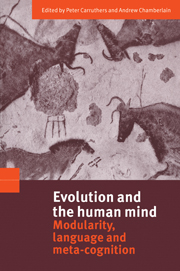Book contents
- Frontmatter
- Contents
- List of contributors
- Preface
- 1 Introduction
- 2 Massively modular minds: evolutionary psychology and cognitive architecture
- 3 Individual differences in early understanding of mind: genes, non-shared environment and modularity
- 4 Darwin in the madhouse: evolutionary psychology and the classification of mental disorders
- 5 Evolution of the modern mind and the origins of culture: religious concepts as a limiting-case
- 6 Symmetry and the evolution of the modular linguistic mind
- 7 Evolution, communication and the proper function of language
- 8 The evolution of knowledge
- 9 Mind, brain and material culture: an archaeological perspective
- 10 The evolution of strategic thinking
- 11 On the origin of the human mind
- 12 The evolution of consciousness
- 13 Evolution, consciousness and the internality of the mind
- References
- Author index
- Subject index
13 - Evolution, consciousness and the internality of the mind
Published online by Cambridge University Press: 18 December 2009
- Frontmatter
- Contents
- List of contributors
- Preface
- 1 Introduction
- 2 Massively modular minds: evolutionary psychology and cognitive architecture
- 3 Individual differences in early understanding of mind: genes, non-shared environment and modularity
- 4 Darwin in the madhouse: evolutionary psychology and the classification of mental disorders
- 5 Evolution of the modern mind and the origins of culture: religious concepts as a limiting-case
- 6 Symmetry and the evolution of the modular linguistic mind
- 7 Evolution, communication and the proper function of language
- 8 The evolution of knowledge
- 9 Mind, brain and material culture: an archaeological perspective
- 10 The evolution of strategic thinking
- 11 On the origin of the human mind
- 12 The evolution of consciousness
- 13 Evolution, consciousness and the internality of the mind
- References
- Author index
- Subject index
Summary
The problem of consciousness seems to arise from experience itself. As we shall consider in more detail below, we are strongly disposed to contrast conscious experience with the physical states or events by which we take it to be realised. This contrast gives rise to dualism and other problems of mind and body. In this chapter I argue that these problems can usefully be considered in the perspective of evolution.
Evolution, mind and the representation of mind
Among other things, an evolutionary perspective brings to the fore a contrast between human and (other) animal minds. Many animals seem to have minds, at least in the minimal sense of a system of internal states which represent the environment, and so enable them to attain goals intelligently, that is, in light of a wide variety of information relevant to this task. A striking thing about human beings, however, is that we also represent our own minds, via the various ways of thinking about internal states encompassed in our concept of mind.
This difference seems linked to one in adaptive function. While the advantages of possessing a mind apparently derive from representing the self in relation to the environment – which of course includes other creatures and their behaviour – those of possessing a concept of mind would seem to flow from representing these representations themselves, and so further anticipating and controlling the behaviour they govern.
- Type
- Chapter
- Information
- Evolution and the Human MindModularity, Language and Meta-Cognition, pp. 276 - 298Publisher: Cambridge University PressPrint publication year: 2000
- 1
- Cited by



